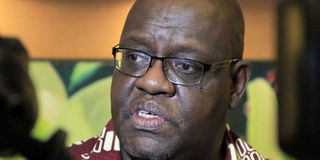Creation of EACC away from Presidency is its Achilles Heel

Inuka Kenya CEO John Githongo. Mr Githongo said the creation of the anti-corruption commission away from the Office of the President is to blame for the failure to fight graft in the country. PHOTO | DIANA NGILA | NATION MEDIA GROUP
What you need to know:
The KACA later morphed into the Kenya Anti-Corruption Commission (KACC) before becoming the EACC in what lawmakers argued was to give it more strength and scope.
Mr John Githongo says corruption is still prevalent because the "centre of power" does not deal with it directly.
Mr Githongo dwelt on culture that he said will keep derailing the war on corruption even if good laws or systems are put in place.
Former anti-corruption czar John Githongo says there is a “mistake” in the way the country is fighting corruption, right from the agencies involved to the culture among Kenyans.
At a forum on integrity issues, Mr Githongo told an audience that the fact that the formation of the Ethics and Anti-Corruption Commission (EACC) was as a result of external pressure rather than national drive means it is difficult to root out graft in the country.
“I have watched the whole journey that this institution (EACC) has taken, and I have watched 22 others around Africa. The pressure to create these institutions was not integral. It was external,” he said during a question-and-answer session of the National Conference on Integrity in Nairobi.
The EACC, the principal agency charged with fighting graft in the country, has its roots in the 1990s, when it was then known as the Kenya Anti-Corruption Authority (KACA), headed by former Kilome MP John Harun Mwau.
The KACA later morphed into the Kenya Anti-Corruption Commission (KACC) before becoming the EACC in what lawmakers argued was to give it more strength and scope.
But Mr Githongo says the creation of the KACA was an imposed culture that technically took away the responsibility to fight corruption from the Presidency.
“These institutions only came to us in the 90s. Most of the countries depended on donors, the World Bank and IMF, who demanded that we fight corruption. My feeling is we made mistakes because we do not own these institutions,” he told an audience, among them Narc-Kenya leader Martha Karua, at the All Africa Conference of Churches in Nairobi.
Mr Githongo, who founded Transparency International-Kenya and later became the government ethics officer under the Kibaki government, had to flee the country after blowing the whistle on the Anglo Leasing scandal.
His story was later told in a book, It is Our Time to Eat, by British journalist Michela Wrong.
CENTRE OF POWER
But he feels corruption is still prevalent because the "centre of power" does not deal with it directly.
“Why did they come? They came because the Attorney-General (at the time) was not prosecuting the cases, DPP was not prosecuting and police were not investigating so we created an agency to go round it,” he later told the Nation.
“Why go round the problem? Like the way we created commissions. What I believe we should have done is, we should have fixed the AG, we should have fixed the police, instead of creating something which is away from the centre of power.”
“In Africa, the centre of power is the OP (Office of the President) and the Treasury. The fight should remain inside the OP so that the President can speak but cannot point a finger of blame elsewhere. He remains responsible,” said Mr Githongo.
During the conference, Mr Githongo, the guest speaker, dwelt on culture that he said will keep derailing the war on corruption even if good laws or systems are put in place.
“The challenge is, after passing all these laws, for 25 years now, corruption has gotten worse. It is worse now than under Moi. How can it be worse? Under Moi it was centralised, now it is free for all.”
“If I am a thief, you don’t look down on me, in fact you want to be closer. Because when things go bad, maybe I may drop you something to keep quiet. Yet we have societies where if you are described as corrupt, you are the person who is looked down upon,” he told the audience.
The two-day conference, whose theme was "translating commitments into results" is organised by the Society for International Development, a local NGO, in conjunction with Transparency International-Kenya.
Other organisations involved include the Social Ministry Research Network Centre, Community Research in Environment and Development Initiatives, Integrated Community Education and Development Association, ActionNow Kenya, the Kenya Legal and Ethical Issues Network.
It is an initiative of the United Nations Development Programme to engage with civil society groups in tackling graft.




